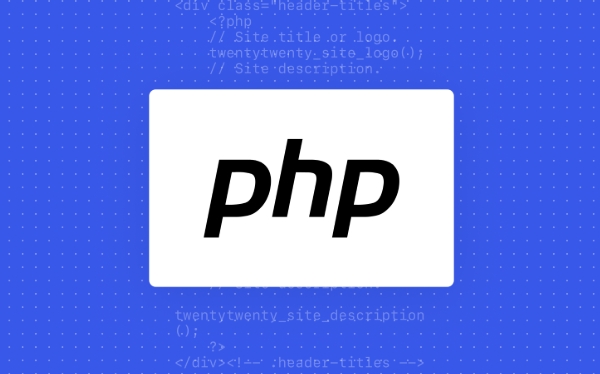 Backend Development
Backend Development
 PHP Tutorial
PHP Tutorial
 PHP Enums: The Modern Successor to Traditional Constant Groups
PHP Enums: The Modern Successor to Traditional Constant Groups
PHP Enums: The Modern Successor to Traditional Constant Groups
Jul 30, 2025 am 04:44 AMPHP enums are the modern, safer alternative to traditional constant groups. 1. They provide type safety, preventing invalid values. 2. They enable IDE autocompletion and better tooling support. 3. They are first-class types usable in type hints and instanceof checks. 4. They allow iteration via cases(). 5. They support methods and behavior on cases. Backed enums map to scalar values, while pure enums represent identity. Migrate when you have fixed sets of options, use strings/integers for states, or need better type safety and tooling. Enums are a fundamental upgrade over constant groups and should be used for new code in PHP 8.1 .

PHP enums are indeed the modern, more robust alternative to traditional constant groups — a shift that brings PHP in line with other modern programming languages. If you’ve been using class constants or global constants to represent fixed sets of values (like status codes, user roles, or order states), enums offer a cleaner, safer, and more expressive way to do it.

Let’s break down why enums are considered the successor and how they improve upon the old ways.
Why Traditional Constant Groups Fall Short
Before PHP 8.1 introduced enums, developers often used class constants to simulate enumerated types:

class OrderStatus
{
const PENDING = 'pending';
const SHIPPED = 'shipped';
const DELIVERED = 'delivered';
}Or sometimes with a list of global constants:
define('STATUS_PENDING', 'pending');
define('STATUS_SHIPPED', 'shipped');
// ...These approaches have several issues:

- ? No type safety — nothing stops you from passing
'cancelled'(misspelled) or even an integer. - ? No autocompletion or IDE support beyond basic constant lookup.
- ? No way to iterate over the possible values.
- ? No distinction between the constant name and its value — they’re loosely coupled.
You could work around some of these with helper methods, but it’s boilerplate-heavy and error-prone.
Enums Bring Type Safety and Clarity
With PHP enums (backed or pure), you define a closed set of allowed values, and the type system enforces it.
Basic Enum Example
enum OrderStatus: string
{
case PENDING = 'pending';
case SHIPPED = 'shipped';
case DELIVERED = 'delivered';
}Now you can type-hint parameters:
function updateStatus(OrderStatus $status): void
{
// $status is guaranteed to be one of the three cases
}This prevents bugs from invalid strings or wrong types being passed in.
Key Advantages of Enums Over Constant Groups
? 1. Type Safety
You can’t accidentally pass 'Pendng' or null where an OrderStatus is expected (if properly type-checked).
? 2. Autocompletion & Tooling Support
IDEs can suggest valid enum cases, reducing typos and improving developer experience.
? 3. First-Class Citizens
Enums are real types. You can use them in type hints, instanceof checks, and even serialize/deserialize safely.
? 4. Iteration
You can loop over all cases:
foreach (OrderStatus::cases() as $case) {
echo $case->value . "\n";
}This is impossible with plain constants without manual arrays.
? 5. Methods and Logic
You can add methods to enums:
enum OrderStatus: string
{
case PENDING = 'pending';
case SHIPPED = 'shipped';
case DELIVERED = 'delivered';
public function isFinal(): bool
{
return $this === self::DELIVERED;
}
}Now each case carries behavior, not just data.
Backed vs Pure Enums
PHP supports both:
- Backed enums have a scalar
value(string or int), useful when mapping to database values. - Pure enums don’t need a backing value and are used when only the identity of the case matters.
// Backed
enum UserRole: string
{
case ADMIN = 'admin';
case USER = 'user';
}
// Pure
enum HttpStatus
{
case OK;
case NOT_FOUND;
case SERVER_ERROR;
}Pure enums are great for state machines or flags where the label is the thing.
When Should You Migrate?
You don’t need to rewrite all your constants tomorrow, but for new code or critical domains (like statuses, permissions, states), enums are the better choice.
Consider switching when:
- You have a fixed, known set of options.
- You’re using strings or integers to represent states.
- You’re doing string comparisons like
if ($status === 'pending'). - You want better type safety and IDE support.
Bottom Line
PHP enums aren’t just syntactic sugar — they’re a fundamental upgrade over constant groups. They give you type safety, better tooling, iteration, and the ability to attach logic to your constants.
If you're on PHP 8.1 , there’s little reason to keep using class constants for enumerated values. Enums are the modern, safer, and more expressive way.
Basically, if you're still defining const groups for statuses or types, it's time to level up.
The above is the detailed content of PHP Enums: The Modern Successor to Traditional Constant Groups. For more information, please follow other related articles on the PHP Chinese website!

Hot AI Tools

Undress AI Tool
Undress images for free

Undresser.AI Undress
AI-powered app for creating realistic nude photos

AI Clothes Remover
Online AI tool for removing clothes from photos.

Clothoff.io
AI clothes remover

Video Face Swap
Swap faces in any video effortlessly with our completely free AI face swap tool!

Hot Article

Hot Tools

Notepad++7.3.1
Easy-to-use and free code editor

SublimeText3 Chinese version
Chinese version, very easy to use

Zend Studio 13.0.1
Powerful PHP integrated development environment

Dreamweaver CS6
Visual web development tools

SublimeText3 Mac version
God-level code editing software (SublimeText3)

Hot Topics
 Understanding Constant Expression Evaluation in PHP's Engine
Jul 29, 2025 am 05:02 AM
Understanding Constant Expression Evaluation in PHP's Engine
Jul 29, 2025 am 05:02 AM
PHPevaluatesconstantexpressionsatcompiletimetoimproveperformanceandenableearlyerrordetection.1.Constantexpressionevaluationmeanscomputingvaluesduringcompilationwhenalloperandsareknownconstantslikeliterals,classconstants,orpredefinedconstants.2.PHP’se
 Namespacing and Constants: Avoiding Collisions in Large-Scale Projects
Jul 30, 2025 am 05:35 AM
Namespacing and Constants: Avoiding Collisions in Large-Scale Projects
Jul 30, 2025 am 05:35 AM
Namespacingpreventsconstantcollisionsinlarge-scalesoftwareprojectsbygroupingrelatedconstantswithinuniquescopes.1)Constants,whichshouldremainunchangedduringruntime,cancausenamingconflictswhendefinedglobally,asdifferentmodulesorlibrariesmayusethesamena
 The Performance Paradigm: Analyzing the Speed of Constants vs. Variables
Jul 30, 2025 am 05:41 AM
The Performance Paradigm: Analyzing the Speed of Constants vs. Variables
Jul 30, 2025 am 05:41 AM
?Yes,constantsarefasterthanvariablesincompiledlanguagesduetocompile-timeevaluationandinlining.1.Constantsareevaluatedatcompiletime,enablingvalueinlining,constantfolding,andeliminationofmemoryallocation,whilevariablesrequireruntimeresolutionandmemorya
 Unveiling the Behavior of Constants within PHP Traits and Inheritance
Jul 29, 2025 am 03:58 AM
Unveiling the Behavior of Constants within PHP Traits and Inheritance
Jul 29, 2025 am 03:58 AM
PHPdoesnotallowconstantredeclarationbetweentraitsandclasses,resultinginafatalerrorwhenduplicateconstantnamesoccuracrosstraits,parentclasses,orchildclasses;1)constantsintraitsarecopieddirectlyintotheusingclassatcompiletime;2)ifaclassdefinesaconstantwi
 Demystifying PHP's Magic Constants for Context-Aware Applications
Jul 30, 2025 am 05:42 AM
Demystifying PHP's Magic Constants for Context-Aware Applications
Jul 30, 2025 am 05:42 AM
The seven magic constants of PHP are __LINE__, __FILE__, __DIR__, __FUNCTION__, __CLASS__, __TRAIT__, __METHOD__, and they can dynamically return code location and context information, 1. LINE returns the current line number, for precise debugging; 2. FILE returns the absolute path of the current file, often used to reliably introduce files or define root directory; 3. DIR returns the directory where the current file is located, which is clearer and more efficient than dirname (__FILE__); 4. FUNCTION returns the current function name, suitable for function-level log tracking; 5. CLASS returns the current class name (including namespace), in logs and factories
 Architecting with Immutability: Strategic Use of Constants in PHP
Jul 29, 2025 am 04:52 AM
Architecting with Immutability: Strategic Use of Constants in PHP
Jul 29, 2025 am 04:52 AM
ConstantsshouldbeusedtoenforceimmutabilityinPHPforbettercodeclarityandsafety;1)useconstantsforconfigurationanddomainlogiclikestatuscodesorAPIendpointstoavoidmagicvalues;2)preferclassorinterface-scopedconstantsoverglobalonestoimprovenamespacinganddisc
 `define()` vs. `const`: A Deep Dive into PHP Constant Declaration
Jul 30, 2025 am 05:02 AM
`define()` vs. `const`: A Deep Dive into PHP Constant Declaration
Jul 30, 2025 am 05:02 AM
Use const first because it parses at compile time, has better performance and supports namespaces; 2. When you need to define constants in conditions and functions or use dynamic names, you must use define(); 3. Only const can be used to define constants in classes; 4. define() can dynamically define expressions and complete namespace strings at runtime; 5. Once both are defined, they cannot be modified, but define() can avoid repeated definitions through defined(), while const cannot be checked; 6. The const name must be literal and does not support variable interpolation. Therefore, const is suitable for fixed and explicit constants, define() is suitable for scenarios that require runtime logic or dynamic naming.
 PHP Enums: The Modern Successor to Traditional Constant Groups
Jul 30, 2025 am 04:44 AM
PHP Enums: The Modern Successor to Traditional Constant Groups
Jul 30, 2025 am 04:44 AM
PHPenumsarethemodern,saferalternativetotraditionalconstantgroups.1.Theyprovidetypesafety,preventinginvalidvalues.2.TheyenableIDEautocompletionandbettertoolingsupport.3.Theyarefirst-classtypesusableintypehintsandinstanceofchecks.4.Theyallowiterationvi





